(a) K
(b) J
maurice.mutuku answered the question on September 10, 2019 at 07:58
- Complete the following equation(Solved)
Complete the following equation

Date posted: September 10, 2019. Answers (1)
- A form one class carried out an experiment to determine the active part of air. The diagram below shows the set-up of the experiment and...(Solved)
A form one class carried out an experiment to determine the active part of air. The diagram below shows the set-up of the experiment and also the observation made.

(a) Identify substance M
(b) State two reasons for the suitability of substance M for this experiment
(c) Write the equation for the reaction of substance M and the active part of air
Date posted: September 10, 2019. Answers (1)
- Draw a dot and cross diagram to show bonding in sulphur (IV) oxide(Solved)
Draw a dot and cross diagram to show bonding in sulphur (IV) oxide
Date posted: September 10, 2019. Answers (1)
- Give one use of charcoal in the sugar refinery industry.(Solved)
Give one use of charcoal in the sugar refinery industry.
Date posted: September 10, 2019. Answers (1)
- Study the flow chart below and answer the questions that follow.(Solved)
Study the flow chart below and answer the questions that follow.

(a) Identify solid G
(b) Write a balanced chemical equation between the yellow solid and dilute nitric acid.
(c) Write the formula of the complex ion in solution F
Date posted: September 10, 2019. Answers (1)
- In a certain reaction, 18.7cm3 of a dibasic acid H2 X required 25cm3 of 0.1M NaOH for complete neutralization.
(a) How many moles of Sodium...(Solved)
In a certain reaction, 18.7cm3 of a dibasic acid H2 X required 25cm3 of 0.1M NaOH for complete neutralization.
(a) How many moles of Sodium hydroxide are contained in 25cm3?
(b) Calculate the molarity of the dibasic acid.
Date posted: September 10, 2019. Answers (1)
- The diagram below shows a set-up of apparatus that can be used to prepare nitrogen (IV) oxide. Study it and use it to answer the...(Solved)
The diagram below shows a set-up of apparatus that can be used to prepare nitrogen (IV) oxide. Study it and use it to answer the questions that follow.
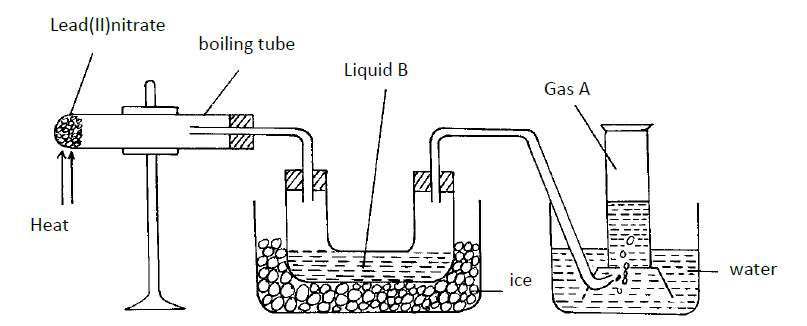
(i) Write the equation for the reaction that takes place in the boiling tube.
(ii) State the observations made in the boiling tube.
(iii) Explain why lead (II) nitrate is preferred over other metal nitrates in this experiment.
(iv) Describe how gas A can be identified.
(b) (i) Name liquid B
(ii) Write a chemical equation to show how liquid B is formed in this experiment.
(c) (i) In another experiment, excess aqueous lead (II) nitrate solution was reacted with a solution which contained 2.34g of sodium chloride. Calculate the mass of precipitate formed in this reaction. (Pb = 207, Cl = 35.5, Na = 23)
(ii) Write an ionic equation for the reaction that takes place when nitrogen (IV) oxide reacts with aqueous sodium hydroxide.
Date posted: September 10, 2019. Answers (1)
- The flow chart below shows some processes in the extraction of zinc. Study it and answer the questions that follow.(Solved)
The flow chart below shows some processes in the extraction of zinc. Study it and answer the questions that follow.
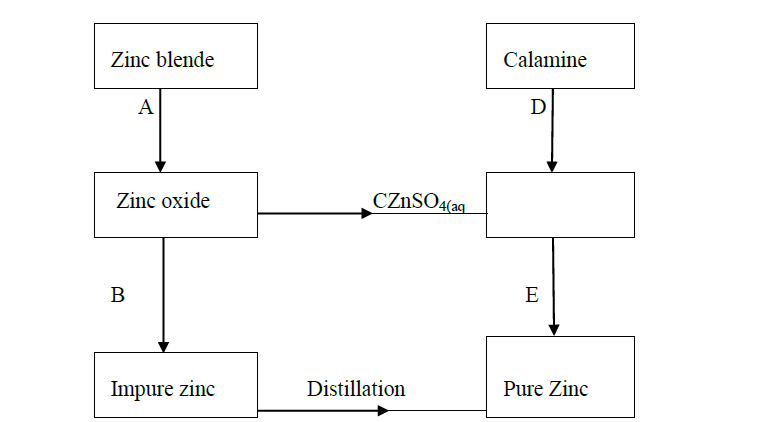
(a) Name the processes represented by A and E.
(b) State the reagents required for processes B, C and D.
(c) Write a chemical equation of the reaction that occurs in process B.
(d) With an aid of a diagram, explain how you would obtain a pure sample of zinc by process E
(e) State two commercial uses of zinc metal.
Date posted: September 10, 2019. Answers (1)
- The enthalpies of combustion of calcium, carbon and decomposition of calcium carbonate are indicated below;(Solved)
The enthalpies of combustion of calcium, carbon and decomposition of calcium carbonate are indicated below;

(i) Draw an energy cycle diagram that links the enthalpy of formation of calcium carbonate to enthalpies of combustion of calcium, carbon and decomposition of calcium carbonate.
(ii) Determine the enthalpy of formation of calcium carbonate.
Date posted: September 10, 2019. Answers (1)
- Study the scheme below and answer the questions that follow.(Solved)
Study the scheme below and answer the questions that follow.
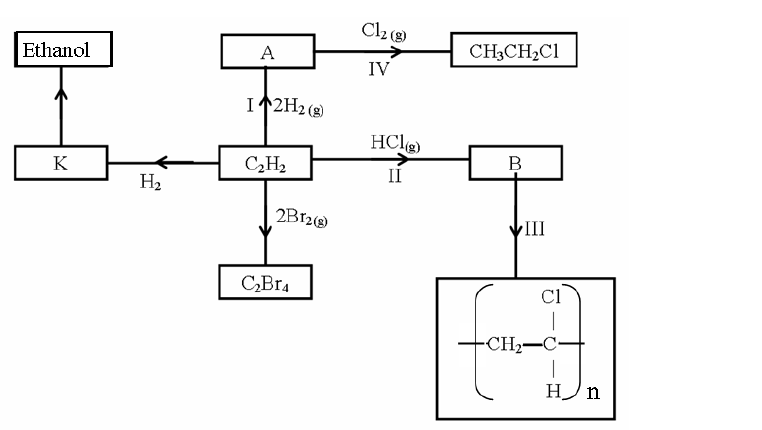
(i) What name is given to the type of cleansing agent prepared by the method above?
(ii) Name one chemical substance added in step II
(iii) What is the purpose of adding the chemical substance named in a (ii) above?
(iv) Name any other suitable substance that can be used in step I
(v) Explain how an aqueous solution of the cleansing agent removes oil during washing
Date posted: September 10, 2019. Answers (1)
- Determine oxidation number of chlorine(Solved)
Determine oxidation number of chlorine in 
Date posted: September 10, 2019. Answers (1)
- 0.22g of metal Q is deposited by electrolysis when a current of 0.06A flows for 99 minutes.
(RAM of Q = 184, 1F = 96500c)(Solved)
0.22g of metal Q is deposited by electrolysis when a current of 0.06A flows for 99 minutes.
(RAM of Q = 184, 1F = 96500c)
(i) Find the number of moles of Q deposited.
(ii) Determine the value of n in the metallic ion Qn+
Date posted: September 10, 2019. Answers (1)
- An aqueous solution of zinc sulphate is electrolysed using platinum electrodes as shown in the set up below.(Solved)
An aqueous solution of zinc sulphate is electrolysed using platinum electrodes as shown in the set up below.
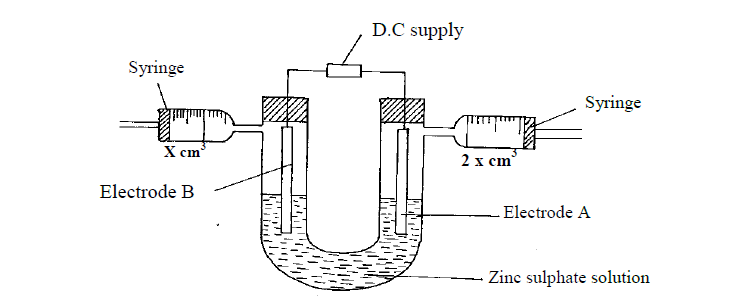
(a) (i) Write a half equation for the reaction taking place at electrode A.
(ii) Identify electrodes A and B
(iii) State and explain the observation at electrode B if copper plate was used instead of platinum electrode.
Date posted: September 10, 2019. Answers (1)
- The grid below shows part of the periodic table. Use it to answer the questions that follow. The letters do not represent actual symbols.(Solved)
The grid below shows part of the periodic table. Use it to answer the questions that follow. The letters do not represent actual symbols.

(a) Which of the elements has the highest atomic radius? Explain.
(b) Identify the most reactive Oxidizing agent. Explain.
(c) Compare the atomic radius of P and R. Explain
(d) Give the formula of one stable ion with an electron arrangement of 2.8 which is:
(i) A Negatively charged divalent ion.
(ii) A Positively charged monovalent.
(e) Given that the mass number of W is 40. Write down the composition of its nucleus
(f) Write the formula of the compounds formed between.
(i) Element R and X.
(ii) Give one property of the structure formed when R and X bond.
Date posted: September 9, 2019. Answers (1)
- Study the section of the polymer below and answer the questions that follow.(Solved)
Study the section of the polymer below and answer the question that follow.

Name the polymer
Date posted: September 9, 2019. Answers (1)
- An element O has two isotopes..(Solved)
An element O has two isotopes  containing 90% and Isotope
containing 90% and Isotope 
Find the R.A.M of O.
Date posted: September 9, 2019. Answers (1)
- The following equation involve hydrochloric acid.
MnO2(s) + 4HCl(aq)------>MnCl2(aq) + 2H2O(l) + Cl2(g)
State the type of reaction taking place in the reaction.
(Solved)
The following equation involve hydrochloric acid.
MnO2(s) + 4HCl(aq)------>MnCl2(aq) + 2H2O(l) + Cl2(g)
State the type of reaction taking place in the reaction.
Date posted: September 9, 2019. Answers (1)
- Study the following part of the solvay process for the manufacture of sodium carbonate and answer the questions that follow:(Solved)
Study the following part of the solvay process for the manufacture of sodium carbonate and answer the questions that follow:
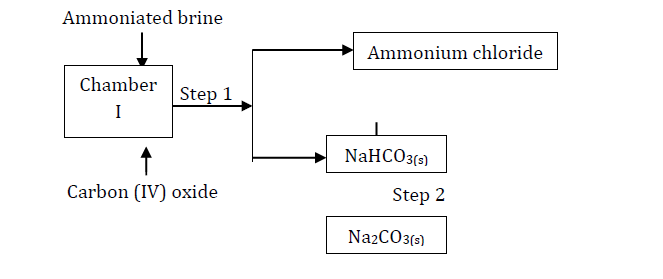
(i) State the main source of Carbon (IV) oxide in the process.
(ii) Write down the overall equation for the reaction in chamber I.
(iii) Name process in step 1.
Date posted: September 9, 2019. Answers (1)
- What is the atomic number and mass number T?(Solved)
A radioactive isotope T decays by emitting three alpha particles to form  .
.
What is the atomic number and mass number T?
Atomic number -
Mass number -
Date posted: September 9, 2019. Answers (1)
- Give the name of the following ion [Zn(NH3)4]2+(Solved)
Give the name of the following ion [Zn(NH3)4]2+
Date posted: September 9, 2019. Answers (1)